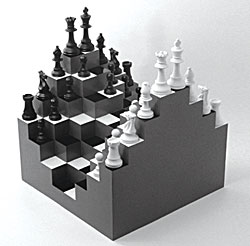 |
Wall Street's crack-up is seen in Asia to presage a global tectonic shift, the beginning of the decline of American power. Yet the dollar, a symbol of American financial power, has surged rather than declined. Foreigners seem have more confidence in America's ability to solve its problems than Americans do.
Many claimed that with the rise of China and the petro-states, an American slowdown could be decoupled from the rest of the world. Crises often refute conventional wisdom, and this one reveals that the underlying strength of the American economy remains impressive.
The larger question concerns the long-term future of American power.
Power always depends on context, and in today's world, it is distributed in a pattern that resembles a complex three-dimensional chess game. On the top chessboard, military power is largely unipolar and likely to remain so for a while. But on the middle chessboard, economic power is already multi-polar, with the US, Europe, Japan and China as the major players, and others gaining in importance.
The bottom chessboard is the realm of transnational relations that cross borders outside of government control. It includes actors as diverse as bankers electronically transferring sums larger than most national budgets, as well as terrorists transferring weapons or hackers disrupting Internet operations. It also includes new challenges like pandemics and climate change. On this bottom board, power is widely dispersed, and it makes no sense to speak of unipolarity, multipolarity, or hegemony.
Even in the aftermath of the financial crisis, the giddy pace of technological change is likely to continue to drive globalization, but the political effects will be different for the world of nation-states and the world of non-state actors. In inter-state politics, the most important factor will be the continuing 'return of Asia'.
The challenge for Barack Obama is that more and more issues and problems are outside the control of even the most powerful state. Although the US does well on the traditional measures of power, those measures increasingly fail to capture much of what defines world politics, which, owing to the information revolution and globalisation, is changing in a way that prevents Americans from achieving all their international goals by acting alone.
For example, international financial stability is vital to American prosperity, but the US needs the cooperation of others to ensure it. Global climate change, too, will affect the quality of life, but the US cannot manage the problem alone. And, in a world where borders are becoming increasingly porous to everything from drugs to infectious diseases to terrorism, America must mobilise international coalitions to address shared threats and challenges.
The problem of American power in the wake of the financial crisis is not one of decline, but of a realisation that even the most powerful country cannot achieve its aims without the help of others. Fortunately, Barack Obama understands that.
Project Syndicate
Joseph S Nye Jr is a professor at Harvard and author of The Powers to Lead.
READ ALSO
Obama mania - FROM ISSUE #424 (07 NOV 2008 - 13 NOV 2008)
Who will run the world now? - FROM ISSUE #424 (07 NOV 2008 - 13 NOV 2008)


